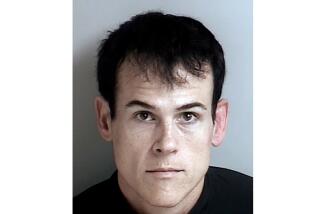Man Admits to Killing 2 Sex Offenders, Cites Idaho Case
- Share via
SEATTLE — The man who confessed to slaying two registered sex offenders in Bellingham, Wash., told police that he was outraged by the recent case of Joseph Edward Duncan III, a convicted sexual predator being held in Idaho.
Michael Anthony Mullen, 36, made a brief court appearance Tuesday in Whatcom County Superior Court, about 80 miles north of here, after turning himself in to Bellingham police Monday afternoon.
Mullen, a longtime resident of Whatcom County with a history of petty crimes, faces charges in the Aug. 26 shooting deaths of Hank Eisses, 49, and Victor Vasquez, 68. Both victims were Level III sex offenders, considered the most likely to commit similar crimes again. Mullen’s arrest all but ended fears that a vigilante was on the loose targeting other registered sex offenders in the Bellingham area.
“It’s a relief that he’s not running around anymore with who-knows-what on his mind, probably more of the same,” said Bellingham Mayor Mark Asmundson, who was informed of Mullen’s arrest minutes after it happened.
Police said Mullen called 911 from a Bellingham restaurant and confessed to the murders. He was arrested and questioned for “hours and hours,” said Bellingham police Lt. Craige Ambrose.
Investigators said Mullen provided details of the crime that only the killer would know, such as the caliber of the weapon and the way in which each victim was shot: once in the head. Ambrose said that during the interview Mullen repeatedly “came back around to the Idaho incident,” referring to the Duncan case.
“Let’s just say he was influenced by what happened there,” Ambrose said.
Duncan, a 42-year-old convicted sex predator from Tacoma, Wash., is in Kootenai County, Idaho, awaiting trial in the slayings of four people and the kidnapping of two children in May near Coeur D’Alene, Idaho. Duncan is being investigated in the deaths of other children across four states, including California.
Less than two weeks after Duncan’s case made national headlines, police said, Mullen got on a Whatcom County website that listed the names and addresses of all Level III sex offenders in the county.
Eisses and Vasquez lived with a third sex offender in a little green house on Northwest Avenue.
According to earlier reports, a man entered the victims’ home, just north of downtown Bellingham, impersonating an FBI agent. He told the men that there was a hit list targeting sex offenders and that he was there to warn them.
The third occupant left for work with the man still in the house. When he returned home from work, he found his housemates dead. Eisses had been convicted of child rape and Vasquez of child rape and molestation. Both men had committed their crimes in Whatcom County.
On Aug. 31, five days after the slayings, the Bellingham Herald received a letter from someone claiming responsibility for the killings and threatening to kill all other Whatcom County sex offenders designated as Level III. The county has 31 registered Level III offenders, including four in Bellingham, which has a population of 71,000.
Police said Mullen had confessed to sending the letter and told investigators that more letters would soon be arriving at other media outlets. Ambrose said he did not know the content of those letters.
Ambrose said Mullen, standing 6 feet 5 and weighing about 250 pounds, had no known history of violence but had an extensive history of theft and other property crimes. Mullen had no permanent address, police said.
The slayings stirred debate over the 1990 state law requiring sex offenders to register their addresses. Washington was the first state to pass such a law, which is intended to help the public keep track of dangerous sexual predators. In 1994, Congress mandated that states create registers of sex offenders. Now all 50 states have their own version of Washington’s Community Protection Act.
Supporters say the public has a right to know about such offenders, but opponents argue that publicizing exact addresses invites vigilantism and prevents sexual offenders from leading normal lives.
More to Read
Sign up for Essential California
The most important California stories and recommendations in your inbox every morning.
You may occasionally receive promotional content from the Los Angeles Times.












